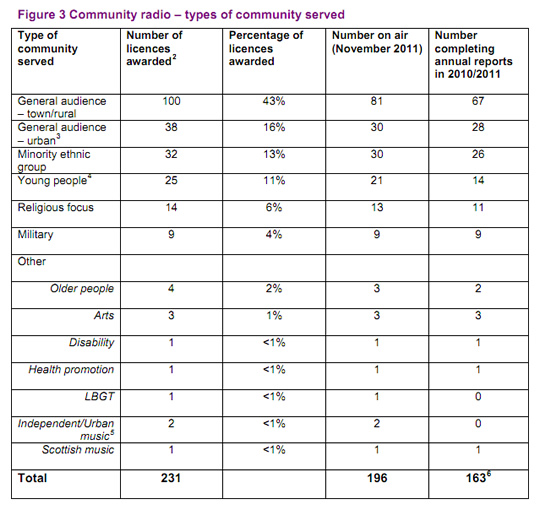 The United Kingdom’s broadcast regulation agency Ofcom has published its annual report (.pdf) on the state of community radio, and the figures indicate that income for UK community outlets has markedly declined. No big surprise, given the global recession. But the data also contains interesting clues suggesting that certain kinds of community radio strategies or missions work better than others. In the UK’s case, it may be that stations that serve specific kinds of audiences do better than signals that just try to cover general geographic areas.
The United Kingdom’s broadcast regulation agency Ofcom has published its annual report (.pdf) on the state of community radio, and the figures indicate that income for UK community outlets has markedly declined. No big surprise, given the global recession. But the data also contains interesting clues suggesting that certain kinds of community radio strategies or missions work better than others. In the UK’s case, it may be that stations that serve specific kinds of audiences do better than signals that just try to cover general geographic areas.
Relative stability
The Ofcom report concludes that average (or mean) community radio income (2011/10) is down by 19 percent. In 2010/09 it dropped by six percent. In 2008/7 it declined by 12 percent. The mean income of UK community outlets clocked in at about £63,000 in 2011/10.
But the numbers don’t look so bad for the UK’s more stable community signals. The survey is based on annual and financial reports from 163 stations. The Ofcom report notes that the average income for stations that have offered reports over the last two years (2010/11 and 2010/9) has dropped by only five percent, from £74,500 in 2009/10 to £70,500 in 2010/11.
“This may indicate that the financial situation for those stations that have submitted annual reports for the last two financial periods has remained relatively stable,” Ofcom notes.
In addition, four stations each earned over £250,000 during 2010/11—a total of £1.5 million. This “equates roughly to the total income of the 74 lowest income stations.”
Targeting an interest
Perhaps the most important part of the study is its observation on which kinds of community stations generate the most income:
Stations targeting a community of interest (rather than a geographic community) reported a higher income than the sector average. Stations serving a general audience in an urban area reported a higher average income than town/rural stations (£89,500 as opposed to £45,000).
The “sector average” reference means the community radio sector, as opposed to commercial or BBC stations. No shock that urban stations do better than town/rural stations. As the table below indicates, most UK community radio stations serve general “town/rural” or “urban” audiences. A significant number serve a “minority ethnic group.”
Others broadcast to “young people,” “older people,” or cite their mission as serving the arts, people with disabilities, LBGT listeners, or lovers of a particular kind of music.
For example: Raidió Fáilte, is described in the report as “the only station in Belfast providing broadcasting services in Irish to the Irish language community in the city and to those interested in the Irish language and culture. Raidió Fáilte continues to provide good quality Irish language broadcasting including speech based and music based programmes produced for and by the Irish language community 24 hours per day.”
Community of interest income has “remained stable,” the report notes, as opposed to stations serving a geographic audience in a town or rural region. Those outlets sustained an income expenditure drop of around £10,000. This report table below indicates the kinds of income upon which UK community radio stations draw.
 SLAs mean “service level agreements”—typically made between the station and say, a town, city or village council. “SLAs allow community radio stations to engage with relevant statutory organisations for the delivery of output of social benefit, in return for funding.”
SLAs mean “service level agreements”—typically made between the station and say, a town, city or village council. “SLAs allow community radio stations to engage with relevant statutory organisations for the delivery of output of social benefit, in return for funding.”
All this tentatively supports a suspicion that I’ve always had about community radio stations in the United States and Canada—those that try to be everything to all listeners (often vaguely defined as “the community”) don’t do as well as those that target specific audiences. But I’m still not sure.



